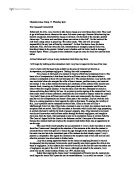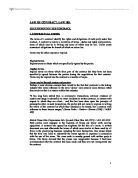This case which would possibly act as a precedent if Lucy’s claim was taken to court, identifies if terms aren’t brought to the attention of the customer at the time the contract is concluded they wont form part of it. Hence the sign brought to the attention of Mrs.Olley in her room was too late to be considered part of the contract she had already signed. Lucy’s postion is comparable. She signed the contract at the reception desk of the club and not until after this occurred was she alerted to further terms.
Lucy has a strong arguement based on the clause not applying because it was not incorporated into the contract, however she could possibly also claim against the club on the basis of negligence. In this instance she would have to rely on the fact her coat was stolen out of negligence on part of the club. If this was so, although not stated in the scenario, Lucy could rely on the Unfair Contract Terms Act 1977, Section 2(2).
Rather than arguing the clause wasn’t incorporated sufficiently into the contract she could argue the clause didn’t pass the test for reasonableness. Lucy could use section 11(1) to argue the clause wasn’t ‘a fair and reasonable one to be included having regard to the circumstances which were, or ought reasonably to have been, known to or in the contemplation of the parties when the contract was made’. The words used in the exclusion clause of the dance club were ambiguous since the word 'loss' is too wide to be reasonable, and according to Lord Justice Scrutton would be rendered ineffective, “If a person is under legal liability and wishes to get rid of it, he can only do so by using clear words”. Lucy could rely on the rulings in such cases as Overseas Medical supplies Ltd V Orient Transport Service Ltd (1999) where it was held the clauses in the contract were invalid, as they didn’t pass the test of reasonableness, due to the wording used. The ambiguity of the word loss would surely be rendered unreasonable due to the many connotations it boasts. Lucy could further question the reasonableness of the clause by referring to the guidelines printed in section 2 determining reasonableness, of which one reads a) “The strength of the bargaining positions of the relative parties to each other.” There is no doubt the dance club were in a more powerful position than Lucy or Robert and this further renders the clause to be unreasonable and ineffective within the contract.
Lucy could choose to adopt either incorporation or negligence as part of her claim against the club, although the more suitable would probably be that of incorporation as it would be difficult to prove the coat was stolen due to negligence on part of the club.
Like Lucy, Robert too could also claim against the club based on the concept of incorporation. However his claim may be more suitably argued on the basis of construction. This is concerned with wording of the clause, Robert able to argue the club are liable to pay him losses because the wording used in the clause didn’t clearly cover the events that took place, making the exemption clause ineffective.
The wording of the clause is "The club will not accept responsibility for any loss suffered by customers". The word ‘loss’ is ambiguous; encompassing a variety of different meanings that can be argued makes the clause ineffective. The courts would apply the Contra Proferentem Rule, whereby the ambiguity of the word ‘loss’ would be interpreted in the claimants favour, namely Robert. Citing Lord Reid in the case of L Schuler A G v Wickman Machine Tools Sales Ltd supports this argument. He said the party relying on the exemption clause should make their intentions "abundantly clear". The club used the word "loss" but the intention behind the wording isn’t clear. With regards to the fact no mention is made in the exemption clause to what ‘loss’ actually construes, whether it be material loss or for example the loss of a limb as in Roberts case, means that the clause is likely to be seen as ineffective and wont form part of the contract. The case of Canada steamship lines ltd v R would be suitable to mention to strengthen Robert’s claim against the club. It lays out a three-stage test to determine liability for negligence and reads " (i) If the contract contains an express exemption from liability for negligence then effect must be given to it” However in the case of Robert it is apparent no reference has been given to the clubs exemption from liability for negligence. (ii) If there is no express reference to negligence, it must be asked whether the words used are wide enough, in their ordinary meaning, to cover liability for negligence; any doubt must be resolved against the party in breach” As has already been established the word ‘loss’ being interpreted in the favour of Robert wouldn’t in its ordinary meaning cover the club for liability for negligence. (iii) Even if the words used are wide enough to cover liability for negligence, it must be asked whether the party in breach could be liable on some ground other than that of negligence. If he, or she could be, and if that other ground is not so fanciful or remote that the party in breach cannot be supposed to have desired protection against it, then it is likely the words will be taken to refer to the non negligent liability only.” This is a very pertinent argument Robert can rely on to strengthen his claim against the club. The club will be unable to rely on the word ‘loss’ to protect them from liability over a broken arm, damaged Rolex, and Lucy’s stolen coat, with the meaning being taken not to cover negligence and therefore Roberts claim for the loss of use of his arm would be very strong.
Further to the concept of the construction, whereby it has been established the club didn’t effectively communicate the meaning of the word loss to include negligence and are therefore liable to be sued by Robert, the question of negligence furthers an alternative argument which strengthen Roberts position to make a claim. Section 2 of the Unfair Contract Terms Act 1997 covers the issue of negligence and states that negligence means the breach of (b) any common law duty to take reasonable care or exercise reasonable skill. From this it can be inferred that Paul has broken the common law duty to take reasonable care are therefore he acted in negligence. Further to this although the club may have intended to remove liability for personal injuries covered in the word ‘loss’, in accordance with section 2(1) of UCTA, even if the word ‘loss’ had been deemed to sufficiently cover the act of negligence, Robert would still be in a position to make a claim. Section 2(1) reads "(1) A person cannot by reference to any contract term or to a notice given to persons generally or to particular persons exclude or restrict his liability for death or personal injury resulting from negligence." Robert's broken arm was caused by negligence on the part of the dance instructor; therefore the club is liable irrespective of any exclusion clause it might have put up.
Robert is in a strong position to claim against the club using both negligence and construction, with both being equally weighted arguments. Although he is in a less strong position to claim for the damage to his watch because it can be argued having danced previously he was aware of the dangers of wearing breakable jewellery whilst doing such an energetic sport. However, if he were to claim for his watch also he would be best also claiming based on negligence.






